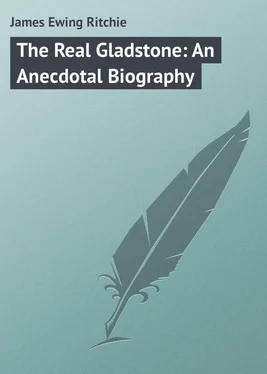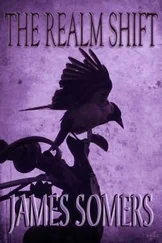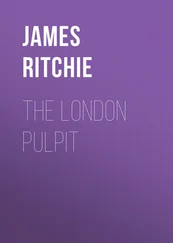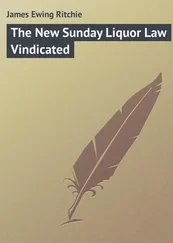James Ritchie - The Real Gladstone - An Anecdotal Biography
Здесь есть возможность читать онлайн «James Ritchie - The Real Gladstone - An Anecdotal Biography» — ознакомительный отрывок электронной книги совершенно бесплатно, а после прочтения отрывка купить полную версию. В некоторых случаях можно слушать аудио, скачать через торрент в формате fb2 и присутствует краткое содержание. Жанр: foreign_prose, на английском языке. Описание произведения, (предисловие) а так же отзывы посетителей доступны на портале библиотеки ЛибКат.
- Название:The Real Gladstone: An Anecdotal Biography
- Автор:
- Жанр:
- Год:неизвестен
- ISBN:нет данных
- Рейтинг книги:4 / 5. Голосов: 1
-
Избранное:Добавить в избранное
- Отзывы:
-
Ваша оценка:
- 80
- 1
- 2
- 3
- 4
- 5
The Real Gladstone: An Anecdotal Biography: краткое содержание, описание и аннотация
Предлагаем к чтению аннотацию, описание, краткое содержание или предисловие (зависит от того, что написал сам автор книги «The Real Gladstone: An Anecdotal Biography»). Если вы не нашли необходимую информацию о книге — напишите в комментариях, мы постараемся отыскать её.
The Real Gladstone: An Anecdotal Biography — читать онлайн ознакомительный отрывок
Ниже представлен текст книги, разбитый по страницам. Система сохранения места последней прочитанной страницы, позволяет с удобством читать онлайн бесплатно книгу «The Real Gladstone: An Anecdotal Biography», без необходимости каждый раз заново искать на чём Вы остановились. Поставьте закладку, и сможете в любой момент перейти на страницу, на которой закончили чтение.
Интервал:
Закладка:
By this time the Tories had become outrageous against Mr. Gladstone. After the defeat of the Derby Government, some of them gave a dinner to Major Beresford at the Carlton, who had been charged with bribery at the Derby election, and had been acquitted. ‘After dinner,’ writes Mr. Greville, ‘when they got drunk, they went upstairs, and found Mr. Gladstone alone in the drawing-room. Some of them proposed to throw him out of the window. This they did not quite dare do, but contented themselves with giving an insulting message or order to the waiter, and then went away.’ But Mr. Gladstone remained a member of the club till 1859. On the Coalition Government being formed under Lord Aberdeen, Mr. Gladstone became Chancellor of the Exchequer. His Budget speech, five hours long, held the House spell-bound. It was devoted mainly to remission of taxation. The deficiency thus created was made up by the application of the legacy duty to real property, by an increase of the duty on spirits, and by an extension of the income-tax at 5d. in the pound to all incomes between £100 and £150. The Irish were indignant at the tax being extended to Ireland. One of the few genuine Irish patriots, Mr. J. O’Neil Daunt, writes: ‘One of Mr. Gladstone’s arguments is curious from its dishonest ingenuity. He extracts from our poverty a pretext for disarming us. Pitt and Castlereagh promised at the Union that Irish taxation should not be approximated to British until an increased prosperity should enable us to bear the increased burden. The prosperity has not come, but the tax must be got. If, says Gladstone, you have not got wealth to be mulcted, your poverty will answer me quite as well. For the purchasing power of £150 is greater in a poor country than a rich one; whence he argues that, as Ireland is poor, an Irish income of £150 is a fitter subject of taxation than an income of equal amount in England. The peculiar beauty of this argument is, that the poorer a country is, the stronger is the force of argument for taxing it.’ Evidently Mr. Gladstone’s Budget found more favour in English than in Irish eyes. The income-tax, said Mr. Gladstone, was to expire in 1860. Alas! he did not then foresee the Crimean War. On the contrary, everything seemed to betoken a happy future.
In May, 1853, Mr. Greville records an interview he had with Sir James Graham. ‘Graham seemed in excellent spirits about their political state and prospects, all owing to Gladstone and the complete success of the Budget. The long and numerous Cabinets, which were attributed in the Times to disunion, were occupied in minute consideration of the Budget, which was there fully discussed; and Gladstone spoke in the Cabinet one day for three hours, rehearsing his speech in the House of Commons, though not quite at such length… He talked of a future head, as Aberdeen is always quite ready to retire; but it is very difficult to find anyone to succeed him. I suggested Gladstone. He shook his head, and said it would not do. He spoke of the great mistakes Derby had made. Gladstone’s object certainly was for a long time to be at the head of the Conservative party in the House of Commons, and to join with Derby, who might, in fact, have had all the Peelites, if he had chosen to ally himself with them instead of Disraeli. The latter had been the cause of the ruin of the party.’
In the same year Bishop Wilberforce wrote: ‘Lord Aberdeen is now growing to look upon Gladstone as his successor, and so told Gladstone the other day.’
A little while after we find Lord Aberdeen saying: ‘Gladstone intends to be Prime Minister. He has great qualifications, but some serious defects. The chief is that when he has convinced himself, perhaps, by abstract reasoning of some view, he thinks that everyone ought at once to see as he does, and can make no allowance for difference of opinion. Gladstone must thoroughly recover his popularity. The Queen has quite got over her feeling against him, and likes him much… I have told Gladstone that when he is Prime Minister I will have a seat in his Cabinet, if he desires it, without an office.’
CHAPTER V
MR. GLADSTONE’S ECCLESIASTICAL OPINIONS
In April, 1856, Mr. Greville writes of a conversation he had with Graham: ‘He began talking over the state of affairs generally. He says there is not one man in the House of Commons who has ten followers – neither Gladstone, nor Disraeli, nor Palmerston.. that Gladstone is certainly the ablest man there. His religious opinions, in which he is zealous and sincere, enter so largely into his political conduct as to form a very serious obstacle to his success, for they are abhorrent to the majority of this Protestant country, and (I was surprised to hear him say) Graham thinks approach very nearly to Rome.’
While absorbed in politics, or literature, or society, Mr. Gladstone never forgot to do his duty to the best of his ability as a loyal son of the Church of England. In 1842 there was a fight at Oxford University on the choice of a Professor of Poetry for the University. One candidate was dear to the High Church party, the other to the Low, or Evangelical, of which Lord Ashley was the head. Mr. Gladstone wrote to Lord Sandon, urging him to entreat Lord Ashley to avoid, for the Church’s sake, the scandal of a contest. But Lord Ashley was on the winning side, and his candidate was returned at the head of the poll.
In 1843, in the debates on the Dissenters’ Chapel Bill, Lord Ashley writes: ‘That inexplicable Mr. Gladstone contended that all Dissent was semi-Arian, and that a vast proportion of the founders were, in fact, Unitarians.’ When, in 1845, Mr. Ward was condemned at Oxford for his book, ‘The Ideal of a Christian Church,’ Mr. Gladstone was one of the non-placets . In a letter to his friend Bishop Wilberforce in 1844, Mr. Gladstone writes: ‘I rejoice to see that you are on the whole hopeful. For my part, I heartily go along with you. The fabric consolidates itself more and more, even while the earthquake rocks it; for, with a thousand drawbacks and deductions, love grows warmer and larger, truth firmer among us. It makes the mind sad to speculate on the question how much better all might have been, but our mourning should be turned into joy and thankfulness while we think also how much worse it might have been. It seems to me to be written for our learning and use: “He will be very gracious unto thee at the voice of thy cry; when He shall hear it, He will answer thee. And though the Lord give you the bread of adversity and the water of affliction, yet shall not thy teachers be removed into a corner any more, but thine eyes shall see thy teachers: and thine ears shall hear a word behind thee, saying, This is the way, walk ye in it.”’
About this time Mr. Gladstone seems to have taken a leading part in the establishment of the High Church College, Glenalmond, instituted for the purpose of turning Presbyterian Scotland from the errors of its ways. At that time Mr. Gladstone was still in bondage. He argued for the maintenance of the Established Church in Ireland. Mr. Gladstone had not advanced beyond his party, and belonged to the school immortalized in ‘Tom Jones.’ ‘When I mention religion,’ says the Rev. Mr. Thwackum, ‘I mean the Christian religion, and not only the Christian religion, but the Protestant religion, and not only the Protestant religion, but the Church of England.’
In opening the Liverpool Collegiate Institution, he pleaded earnestly for Christian teaching. ‘If you could erect a system,’ he said, ‘which presents to man all branches of knowledge save the one that is essential, you would only be building up a tower of Babel, which, when you had completed it, would be the more signal in its fall, and which would bury those who had raised it in its ruins. We believe that if you can take a human being in his youth, and make him an accomplished man in natural philosophy, in mathematics, or in the knowledge necessary for the profession of a merchant, a lawyer, or a physician; that if in any or all of these endowments you could form his mind – yes, if you could endow him with the power and science of a Newton, and so send him forth, and if you had concealed from him – or, rather, had not given him – a knowledge and love of the Christian faith, he would go forth into the world, able, indeed, with reference to those purposes of science, successful with the accumulation of wealth for the multiplication of more, but poor and miserable and blind and naked with reference to everything that constitutes the true and sovereign purpose of our existence – nay, worse with respect to the sovereign purpose than if he had still remained in the ignorance which we all commiserate, and which it is the object of this institute to assist in removing.’
Читать дальшеИнтервал:
Закладка:
Похожие книги на «The Real Gladstone: An Anecdotal Biography»
Представляем Вашему вниманию похожие книги на «The Real Gladstone: An Anecdotal Biography» списком для выбора. Мы отобрали схожую по названию и смыслу литературу в надежде предоставить читателям больше вариантов отыскать новые, интересные, ещё непрочитанные произведения.
Обсуждение, отзывы о книге «The Real Gladstone: An Anecdotal Biography» и просто собственные мнения читателей. Оставьте ваши комментарии, напишите, что Вы думаете о произведении, его смысле или главных героях. Укажите что конкретно понравилось, а что нет, и почему Вы так считаете.












